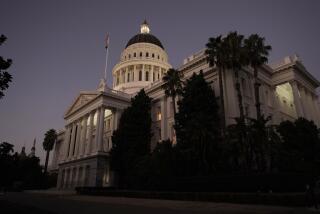House panel considers Internet sales tax compromise
WASHINGTON — Seeking to end the long-running battle over the collection of sales taxes for online purchases, the House Judiciary Committee debated possible compromises that included two ideas to tax Internet sales based on the retailer’s home state, rather than the buyer’s.
Proponents said at a hearing Wednesday that such a system would be easier for Web-based retailers to implement because they would need to consult only a single tax rule rather than comply with more than 9,600 local and state tax jurisdictions nationwide.
“The way to level the playing field is to make sure that every business — brick-and-mortar or online — is required to do things the same way and follow the same rules,” said Chris Cox, a former Republican congressman and counsel to NetChoice, an advocacy group that represents EBay Inc., Overstock.com Inc. and other online sellers.
Small online retailers have led opposition to proposals to allow each state and locality to require that Internet retailers collect sales taxes on behalf of the state’s residents.
Cox noted that the proposal, known as an origin-based tax, mirrored the method of tax collection for conventional bricks-and-mortar retailers, which use the tax rate of the county or state where the store is located and the sale occurs.
Under a 1992 Supreme Court ruling, states are permitted to collect sales taxes only from retailers with a physical presence in their state. With the rise in electronic commerce, states have complained that they are losing $23 billion a year in sales tax revenue because the court decision exempts many Internet transactions.
Though there’s general agreement that Congress should regulate how Internet retailers collect sales tax, Wednesday’s hearing — the latest of more than 30 held by Congress on the issue — offered little hope that lawmakers were any closer to a consensus.
The Senate approved bipartisan legislation last year allowing states to require that large Internet retailers collect sales taxes regardless of their physical location.
But in the Republican-controlled House, the Senate’s Marketplace Fairness Act stalled, facing opposition from anti-tax advocates and small online retailers that fear burdensome compliance rules.
Large online retailers, such as Amazon.com Inc., initially resisted the Senate bill but now support it.
Citing the complexity of the issue, Committee Chairman Bob Goodlatte (R-Va.) said the purpose of the hearing was “to start winnowing down the proposals” in an attempt to work toward an alternative to the Senate bill.
Critics of the NetChoice idea to collect taxes based on the retailer’s location said it would “upend” the current system and result in a tax on production, rather than consumption.
Stephen P. Kranz, a tax lawyer at McDermott Will & Emery, said such a system could create loopholes for companies seeking to avoid collecting sales taxes altogether.
“Great tax lawyers other than myself will help companies figure out how to game an origin system very easily,” Kranz said.
Others said such a system would drive Internet retailers to relocate to states that have no sales taxes.
Given expanding online retail sales, which now account for nearly 6% of all sales, the National Retail Federation, which represents bricks-and-mortar businesses, urged the committee to end the “unfair price and market advantage” that online retailers enjoy by not having to collect sales tax on all purchases.
States also are anxious for Congress to act. California lost about $2 billion in taxes on sales by out-of-state online retailers in 2012, according to data from the National Conference of State Legislatures.
During the hearing, Rep. Steve King (R-Iowa) said his state’s governor intends to use the new revenue to provide tax cuts. Other states said they need the tax revenue for infrastructure development.
Rep. Jackie Speier (D-Hillsborough), who is sponsoring a House version of the Marketplace Fairness Act, said congressional action is needed to bring parity between e-commerce and conventional retailers.
“[When] you look at it in the cold light of day, you cannot somehow suggest that it is fair that some retailers have to collect the sales tax and others do not,” she said.
More to Read
Inside the business of entertainment
The Wide Shot brings you news, analysis and insights on everything from streaming wars to production — and what it all means for the future.
You may occasionally receive promotional content from the Los Angeles Times.










